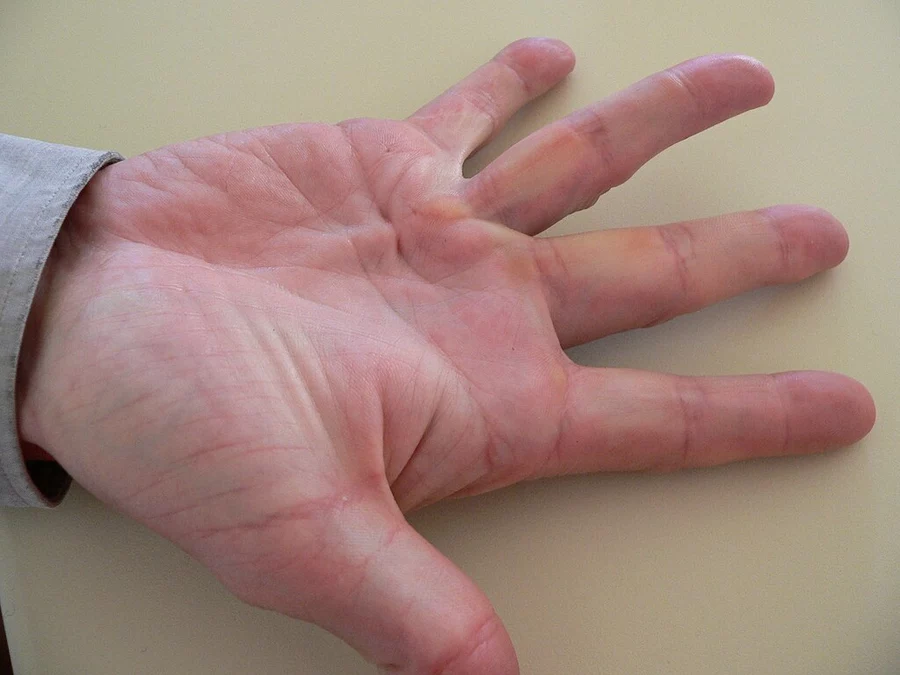
Powered By





Dupuytren’s contracture, a condition that causes the hand tissue to stiffen and the fingers to curl toward the palm, may seem unrelated to heart disease at first glance. However, research from the journal Nature suggests there could be a connection between the two.
One in 20 Americans is living with Dupuytren’s contracture, and it has affected celebrities including Ronald Reagan, Frank Sinatra, and Margaret Thatcher. Chances are, you or someone you know has this hand condition. Whether you’re living with Dupuytren’s contracture, heart disease, or both, read on to learn scientists’ theories for this unique connection.
Dupuytren’s contracture, also known as Dupuytren’s disease, begins with the thickening of connective tissue in the palm, which forms small bumps under the skin called nodules. Over time, these nodules develop into cords that gradually tighten, pulling the fingers into a bent position. This progression leads to hand deformities, making it difficult to perform daily tasks.

Dupuytren’s contracture commonly affects the ring and little fingers, often making it hard to straighten them completely. Although it can affect one or more fingers at a time, Dupuytren’s contracture tends to progress slowly, affecting hand function as the disease progresses.
The initial sign of Dupuytren’s contracture is often a small lump or nodule in the palm, usually near the base of the ring or little finger. These nodules may eventually become tough bands of tissue that limit your finger’s range of motion. Sometimes, they can go away on their own.
This condition can greatly affect your ability to do daily tasks, such as grasping objects, shaking hands, or putting on gloves. Musicians, technicians, and anyone who uses their hands in their jobs may find their daily lives more challenging. This can have huge negative impacts on one’s quality of life.
Scientists and doctors haven’t discovered a clear reason why people develop this condition. An article from the journal Scientific Reports describes a set of risk factors that are associated with the development of this hand disease.
You may develop Dupuytren’s contracture without any of these risk factors, or you may have multiple risk factors and never develop this disease.
If you’re living with Dupuytren’s contracture, there are treatment options usually offered by hand surgeons that can help you regain some hand function.
Treatment of Dupuytren disease includes:
People may need one or more of these treatments throughout their lifetime, as symptoms are likely to return. These treatments, combined with physical therapy and the use of a hand splint, can help reduce symptoms and improve quality of life.
Hand symptoms are only part of the picture for people with Dupuytren’s contracture — this condition is tied to heart disease, some cancers, and early death. The reason why is not fully understood.
While the connection between Dupuytren’s contracture and heart disease may seem random, this unique hand condition has been associated with heart health in scientific studies. As of now, the reason for this connection is currently a mystery. A few theories have been proposed.
Some of the risk factors for Dupuytren’s contracture are similar to the risk factors for heart disease, such as:
People with these risk factors have a greater chance of developing Dupuytren’s contracture and, separately, a greater chance of developing heart disease.
One of the strongest and well-established risk factors for both Dupuytren’s contracture and heart disease is having type 2 diabetes. One study published in the journal Nature found that people with diabetes have 2.2 to 2.7 times the risk of having Dupuytren’s contracture. Women were more prone to this association than men. The reason for this isn’t fully understood.
Alcohol use is another shared risk factor. The study found that people who consumed large amounts of alcohol had 2.5 to 3.56 times the risk of having this hand condition. This effect was also greater in women than in men. Scientists are not sure why this relationship exists.
Interestingly, not all of the risk factors for these two conditions are the same. Men who have a high BMI have a higher risk of developing heart disease but a lower risk of developing Dupuytren’s contracture.
There are many steps that you can take to lower your risk for heart disease. Some lifestyle changes include avoiding tobacco or excessive drinking, maintaining a healthy weight, eating a healthy diet, and treating other conditions such as diabetes and hypertension. Although you can’t control everything, such as your age, sex, or genetics, living a heart-healthy lifestyle can help people with or without Dupuytren’s contracture avoid the consequences of heart disease.
There’s no proven way to reduce your risk for Dupuytren’s contracture, but these lifestyle modifications can help you avoid some of the full-body consequences of this not-so-rare condition.
If you have questions about your heart health, or you think you may have Dupuytren’s contracture, speak with your healthcare team. They can help diagnose and treat you for the conditions that you’re living with, even if they seem unrelated to heart disease.
On MyHeartDiseaseTeam, people share their experiences with heart disease, get advice, and find support from others who understand.
Have you been diagnosed with Dupuytren’s contracture? How has it affected your life? Let others know in the comments below.
Get updates directly to your inbox.



Become a member to get even more




This is a member-feature!
Sign up for free to view article comments.
A MyHeartDiseaseTeam Member
My primary doctor told me I have an onset of this disease. Not looking towards the future with another disability.
We'd love to hear from you! Please share your name and email to post and read comments.
You'll also get the latest articles directly to your inbox.